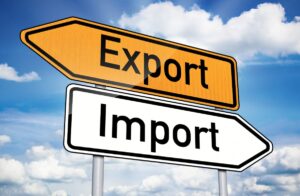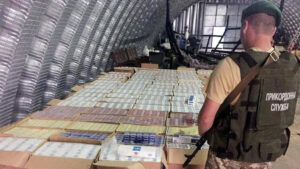
Ukraine’s exports in April this year increased by 11% compared to March and reached 13.1 million tons, the best result since the full-scale Russian invasion, First Deputy Prime Minister and Minister of Economy Yulia Svyrydenko said on Facebook on Wednesday.
“This is an absolute record for the entire period of the full-scale war. For example, in March, exports amounted to 11.8 million tons, in January – 12 million tons. Importantly, this figure is higher than the level of pre-war February 2022. Back then, we exported 12.8 million tons,” the Minister of Economy reminded.
According to her, in monetary terms, exports in April amounted to $3.3 billion compared to $3.2 billion in March.
Svyrydenko noted that the growth in exports was primarily due to the operation of an alternative sea corridor, which made it possible to partially compensate for losses in the economy due to the blockade of the Polish-Ukrainian border, as well as the introduction of a mechanism for insuring ships against military risks, which initially applied only to agricultural products, but was soon expanded to all non-military cargo.
“Of course, the growth and expansion of the capacity of the Solidarity Roads, primarily with Moldova and Romania, has also added to the growth. And the improvement of the conditions for the transportation of goods by rail to the Danube ports,” the Deputy Prime Minister said.

Transportation costs for importing goods have quadrupled compared to pre-war levels, and transport delays at the border average 20 days, said Dmytro Derevytskyi, chairman of the board of directors of the national marketplace network Allo Dmytro Derevytskyi, chairman of the board of directors of the national market chain Allo.
“In the pre-war period, a truck from Warsaw to Lviv cost about EUR1.3 thousand, then in 2022 – EUR2-2.5 thousand. Now the freight is about EUR4.8 thousand and changes daily, somewhere plus or minus EUR300,” he explained at a discussion organized by Deloitte in Kyiv on Wednesday.
He also noted that the search for alternative options (to the Polish border) is not optimal. According to him, the company has redirected its trucks to Slovakia, Hungary and Romania amid the blockade of the Polish border, but the checkpoints there do not have the capacity to quickly process the increased flow of freight traffic. Waiting times at the border from Romania, Hungary, and Slovakia range from 3 to 6 days, and taking into account the queue at the Ukrainian border for exit (14 days), trucks stand in line for about 20 days.
“The cost of funds in Ukraine is very high. Imagine which business will be able to pay for this downtime for such a long time,” Derevytsky said and called on business associations to lobby for at least a reduction in transport downtime on the Ukrainian border.
Allo LLC was established in 1998. The group’s network includes showrooms under the Allo Mah and Allo brands, Mi stores and outlets under the brands of telecom operators.
According to the Opendatabot resource, the participants of Allo LLC are PE Dniproinvest 2016 (95.19%), Dmytro Derevytskyi (3.6%), and Maksym Raskin (1.21%). Derevytskyi is listed as the ultimate beneficiary.

Ukraine’s exports of goods in January-February 2024 increased by 4.6% y-o-y, from $6.5 billion to $6.8 billion, while imports decreased by 1%, from $10.1 billion to $10 billion, the State Customs Service reported on Friday.
According to its post on Telegram, in the first two months of 2024, trade turnover increased by 2% compared to two months of 2023, to $16.8 billion.
In January, the State Customs Service reported a 9.7% increase in exports from $3.1 billion to $3.4 billion and a 6.3% increase in imports from $4.8 billion to $5.1 billion. Taking into account these data, in February, exports remained at the level of February last year – $3.4 billion, while imports decreased by 7.5% to $4.9 billion.
The agency noted that taxable imports in January-February amounted to $8.8 billion, or 88% of total imports, and the tax burden per 1 kg was $0.47/kg, which is 5% more than in the same period in 2023.
According to the State Customs Service, the largest imports to Ukraine in the first two months of this year were from China – $2 billion, Poland – $1.1 billion, and Germany – $769 million.
Ukraine exported the most to Poland – $649 million, Spain – $624 million, and China – $504 million.
As stated in the report, 67% of the total volume of goods imported in January-February 2024 was machinery, equipment and transport – $3.5 billion (UAH 25.3 billion was paid to the budget during customs clearance, which is 31% of customs revenues), chemical products – $1.8 billion (UAH 12.8 billion was paid to the budget, or 16% of customs revenues) and fuel and energy products – $1.3 billion (UAH 20 billion was paid, or 24% of revenues).
The top three most exported goods from Ukraine were food products – $4.5 billion, metals and metal products – $726 million, and mineral products – $587 million.
According to the report, in the first two months of 2024, UAH 47.96 million was paid to the budget during customs clearance of exports of goods subject to export duties.

Ukraine’s exports of goods in 2023 fell by 18.5% year-on-year, from $44.2 billion to $36 billion, while imports increased by 14.4%, from $55.5 billion to $63.5 billion, the State Customs Service reported on Friday.
As a result, according to its data, Ukraine’s foreign trade turnover in 2023 decreased by only 0.3% to $99.4 billion.
It is specified that taxable imports amounted to $52.6 billion, or 83% of the total volume of imported goods. It is noted that the tax burden per 1 kg of taxable imports in 2023 increased by 38% to $0.49/kg.
According to the published data, China imported the most goods to Ukraine – $10.4 billion, Poland – $6.6 billion and Germany – $4.9 billion, while the most were exported to Poland – $4.7 billion, Romania – $3.7 billion, and China – $2.4 billion.
Machinery, equipment and transport accounted for 65% of the total volume of goods imported in 2023 – $19.8 billion (UAH 141.7 billion, or 31% of customs revenues, was paid to the budget during customs clearance of such goods), chemical products – $11 billion (UAH 74.8 billion, or 16% of customs payments) and fuel and energy products – $10.3 billion (UAH 103.4 billion, or 23% of customs payments).
The top 3 exports from Ukraine in 2023 were food products – $21.8 billion, metals and metal products – $3.9 billion, and machinery, equipment and transport – $2.9 billion.
The State Customs Service clarified that UAH 559.2 million was paid to the budget during customs clearance of exports of goods subject to export duties.

The Verkhovna Rada of Ukraine (hereinafter – the VRU) is considering Draft Law #5420 “On Amendments to the Criminal and Criminal Procedure Codes of Ukraine on Criminalization of Smuggling of Goods” dated 04/23/2021 (hereinafter – Draft Law #5420). The above draft law is currently being prepared for the second reading.
Adoption of the Draft Law No. 5420 without its finalization and without taking into account the comments expressed by the business community may harm law-abiding businesses, which today face significant problems when exporting and importing goods due to the blocking of Ukraine’s borders and the inability to carry out transportation by other means than land.
During the previous stages of consideration of Draft Law #5420 in the Parliament, Chamber Member Companies’ experts repeatedly provided comments and suggestions to the text of the document. The Chamber Member Companies’ experts are grateful to MPs and members of the relevant VRU Committees for taking into account some of the proposals of the business community (in particular, removing the article on “False Declaration of Goods” from the Draft Law #5420). At the same time, the business community reiterated its proposal to supplement the sanction of the proposed article of the Criminal Code of Ukraine (hereinafter – the CCU) with provisions on mandatory confiscation and destruction of alcoholic beverages and tobacco products that are smuggled. In addition, the Chamber Member Companies’ experts strongly oppose the wording of Article 201-3 of the CCU “Smuggling of Goods” (regarding non-taxable goods) contained in Draft Law #5420.
The Chamber Member Companies unequivocally support the government’s intentions to combat illegal schemes in customs clearance of goods, in particular, if the subject of the offense is excisable goods. Since tax revenues from excisable goods, in particular, help to fill the State Budget during the ongoing war, it is crucial to effectively combat illegal import of such products into Ukraine. In addition, the illegal export of excisable goods from Ukraine damages the reputation of our country in relations with international partners. For example, according to a recent study by KPMG, Ukraine is the second largest supplier of illegal tobacco products to the European Union (EU) market. At the same time, criminal liability for smuggling excisable goods is enshrined in the EU legislation.
At the same time, the introduction of criminal liability for smuggling of non-excisable goods in the wording proposed by the draft law will not only not contribute to the effectiveness of combating the shadow economy, but will, on the contrary, lead to numerous corruption risks and prerequisites for abuse by regulatory and law enforcement agencies, as well as illegal pressure on legally operating businesses.
In particular, the legal construction of the objective side of the crime of “moving goods across the customs border of Ukraine outside customs control or concealed from customs control” is an outdated norm of the USSR, and is also extremely vague, in fact allowing the registration of criminal proceedings in any disputable situations arising during customs control (including in the absence of criminal intent, as the current version of the draft law does not provide for an intentional form of guilt in smuggling).
Representatives of the business community sent numerous letters to MPs and public authorities asking them to substantially revise Draft Law No. 5420 and hold thorough discussions with business and experts.
The American Chamber of Commerce calls on MPs to finalize Draft Law #5420 and remove the proposed wording of Article 201-3 of the CCU “Smuggling of Goods” or significantly change the wording of the description of the objective side of the crime, providing that criminal liability is incurred exclusively for intentional customs fraud committed with the purpose of evading customs duties or avoiding non-tariff regulation.

The Hungarian government will protect farmers and, if necessary, close the border to some grain products coming from Ukraine from September 16, Hungarian Agriculture Minister Istvan Nagy told the Transit political festival in Tihany.
“If the EU does not extend the import ban on some Ukrainian grain products, which expires on September 15, Hungary will impose an import ban not only on four products, but on all 24 previous products in order to protect the domestic market,” the Hungarian publication agrarszektor.hu quoted the minister as saying.
According to him, Hungary’s agriculture has experienced one shock after another in recent years. The coronavirus epidemic, drought, the war raging in the neighborhood and its consequences, the energy crisis, and the fact that cheap Ukrainian agricultural products have flooded the European market duty-free are all difficulties for producers, he said.
“Although the harvest is better – a near-record amount of corn is expected this year – sales are facing difficulties due to cheap competition,” Nagy added.
As reported, Polish Agriculture Minister Robert Telusz said after a meeting of a coalition of five frontline countries in Poland on Friday that the position of Poland, Hungary, Bulgaria, Slovakia and Romania on the need to extend restrictive measures against Ukrainian wheat, rapeseed, corn and sunflower remains unchanged – a ban until the end of 2023.
The European Commission on June 5 agreed to extend until September 15 the restrictions on wheat, corn, rapeseed and sunflower exports from Ukraine to Bulgaria, Hungary, Poland, Romania and Slovakia. “The restrictions do not mean a ban on the transit of these goods through Bulgaria, Hungary, Poland, Romania and Slovakia,” the document signed by EC chief Ursula von der Leyen said.
Source: https://www.agrarszektor.hu/szabalyozas/20230827/nagy-istvan-fenntartjuk-a-behozatali-tilalmat-44906